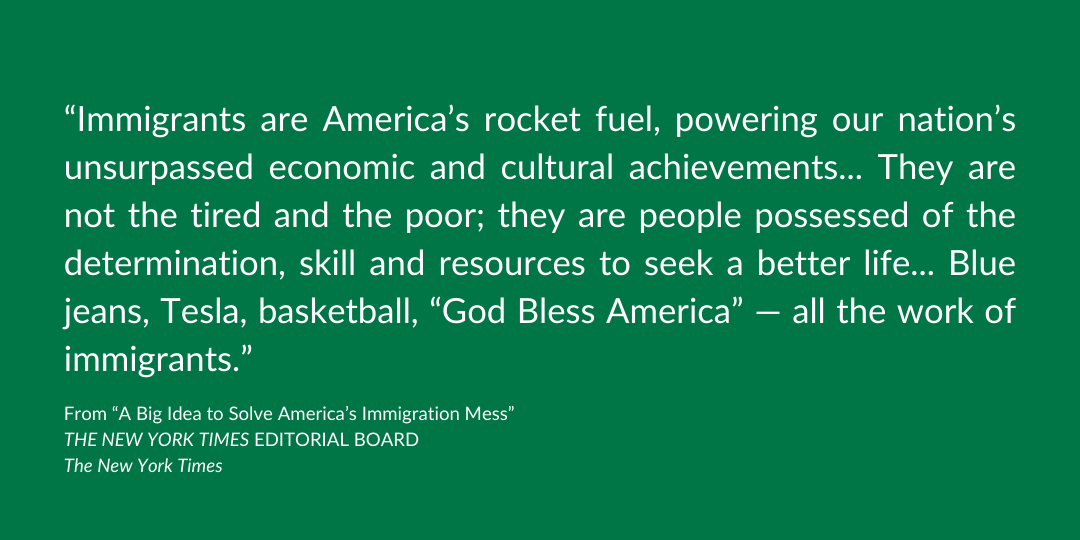As we draw closer to the final tally for the 2020 presidential election and reflect on how our fellow Americans voted, it’s an opportune time to revisit Dr. Eddie Glaude, the Chair of the Department of African American Studies at Princeton University, speaking about President Donald Trump and racism in the United States. Stay safe, everyone.
“Brain Drain” Risks American Advantages
Damaged Dignity Through Deportation
Irish Contributions to American Culture
The Fabric of America
A Tribute to Immigrant Veterans
“Do Politicians Realize How Difficult and Rare Immigrating to the U.S. Legally Actually Is?”
This Is Us
TIME: “US and Australia Might Be Close to a Deal on Refugee Swap”
The United States and Australia are arranging a deal to “swap” refugees from each country’s extraterritorial refugee centers. Australia has approximately 1,800 asylum seekers in camps on the islands of Nauru and Papua New Guinea, many of whom have fled conflict or extreme economic poverty from countries including Pakistan, Iraq, Iran, Sri Lanka, and Afghanistan. Critics have labeled these camps Australia’s “Guantanamo Bay,” and alleged that refugees have been mistreated in the camps. Australia announced at President Barack Obama’s global migration summit that it would exchange their own migrants for those in US-backed detention camps in Costa Rica.
The resettlement process will be administered with the United Nations refugee agency UNHCR, and US authorities will conduct their own assessment and review of refugees along with security checks. The need to resettle these refugees has become a priority for the Australian government because of Papua New Guinea’s order to close the Australian-run detention center and ruling stating that the refugees were held there illegally. Australia has a strict policy to never settle asylum seekers who arrive by sea, in order to deter human smugglers bringing over refugees to Australia by boat, typically from Indonesian ports. The refugee exchange with the US will be a way around this law, and will allow the government to deal with the refugees at these detention centers and potentially close them.
Australian Prime Minister Malcolm Turnbull says that the responsibility to “stop the boats” has fallen to his government, and that this refugee swap wouldn’t be repeated or extended to asylum seekers not already in camps, although the Australian government has previously arranged with other foreign governments to accept asylum seekers. “Our priority is the resettlement of women, children and families. This will be an orderly process [and] it will not be rushed,” Turnbull says in the Wall Street Journal.
UN Special Rapporteur on the Human Rights of Migrants Francois Crepeau, who says that refugees at the detention centers on Nauru have experienced cruel, inhuman, and degrading treatment or punishment, welcomes the refugee exchange with the US. “We don’t know how it’s going to develop, but I certainly hope that it develops in a way that offers refugees and asylum seekers solutions, and if it succeeds at emptying Manus and Nauru, I think this will be a great achievement,” Crepeau tells reporters in Canberra, Australia.
The refugee agreement could potentially be opposed by President-elect Donald Trump, who during his campaign called for tighter immigration controls and spoke of banning Muslims from immigrating to the US. Mark Krikorian, executive director of the anti-immigration Center for Immigration Studies, predicts a "firestorm" of opposition from anti-immigration activists regarding the refugee exchange. "It's so difficult to justify," he tells Fairfax Media. "I don't expect any Republicans will defend it. I can't see a lot of Democrats defending it either. My sense is that when the word gets out on this, it'll be dead on arrival." Other governmental figures are more optimistic the deal will go through. Senior Australian government minister Christopher Pyne believes the deal can be finalized during Obama’s term. "There certainly is time—two and a half months is plenty of time—and if that's the case, it will be a great achievement for the Turnbull government," Pyne tells Nine Network television.
Regarding the pending deal, Amnesty International says in a statement that it is concerned about the lack of information provided by the Australian government around the timeline of the deal as the exact numbers of people who will be given the opportunity to settle in the US.







